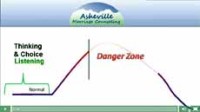Hey. Geoffrey here today in my office with my whiteboard to be able to demonstrate a diagram that I have used with my marriage counseling clients, and frankly with any all of my clients, more than any other diagram, And it seems to be almost universally helpful for them to better understand how emotion can overtake our thinking and how it can lead us to behaviors and fights that we might regret or things that might have a germ of truth for us, but become expanded into a much more intense expression than we would like.
Now obviously this is something that occurs a lot in fights and arguments; and that’s the context of were going to use today for understanding this diagram. Or perhaps, that’s better stated, were going use this diagram to understand what happens in fights and arguments. So let me go ahead and make a drawing of this very complex diagram.
So we zoomed on this now just a little bit perhaps you can see why my marriage counseling clients often refer to this as the swoop diagram. Now not to worry my dear friends and clients who have been in the office with me while I used the whiteboard, I am not going to actually make you watch this video with me drawing on the whiteboard. I happen to have some of the most atrocious penmanship in the business, so let’s go ahead and switch over to the digital version of the whiteboard and I go ahead and demonstrate this concept and this very useful diagram using that.
Okay, so here we have a somewhat cleaner and prettier version of the ‘swoop diagram’, which we use to represent an emotional charge and discharge cycle. Now we’re talking about fights and arguments and how this applies to fights, so will be talking about anger as the emotion. But, this applies to all emotions and the cycle is something that is a natural function that’s built into our neurology.
Let’s take a look at it… and for our purposes in marriage counseling there are essentially four parts that we want to attend to. We have our normal day-to-day thinking decision-making capability and when progressing along through the day, something triggers an emotional reaction. We have that emotion charge and then eventually it reaches a peak, it discharges, and then we returned back to our normal day-to-day thinking. So it has the four steps; normal thinking, emotional charge, emotional discharge, and then returning to normal day-to-day experience.
In this first section of the video I’m going to go over how this cycle, the neurological emotional charge and discharge cycle, affects our thinking and our behavior leading to fights and arguments in marriage. And in the second section I’ll go over the places where we can do things differently to get the most benefits, in order to avoid getting into those kinds of fights.
So let’s go ahead and take a look at the first stage, which is our normal day-to-day experience. And in that state we generally have our thinking and choice available to us… and it’s not unless something occurs that triggers an emotional reaction for us that we start to have an emotional response. But, emotion actually occurs before our thinking does, so we have an emotional experience and then we think about it to make sense of it.
In this case were talking about fights and arguments, so emotional trigger would be a trigger some kind of anger. Now if you get into fights with your marriage partner it probably doesn’t start out with full-blown anger. More likely you would describe it as being annoyed or irritated or I got frustrated with him or her, but those are really all kind of low-level descriptive terms for the underlying emotion of anger. So, we have an annoyance… our spouse says or does something we don’t like… perhaps we don’t respond well. They get defensive… we get defensive… and what happens, if we persist in that back and forth, is our experience of anger increases – and very likely so does that of our partner.
One thing important to recognize is as our anger increases and takes up more and more of our energy and focus, our ability for thinking and choice diminishes. And for almost everyone, unless the person’s done a lot of work on mindfulness and awareness, there is a neurological trip wire in the brain that operates by default. This tripwire is like an on off switch that rests in the amygdala and triggers when we feel threatened.
When we become highly charged with anger or highly charged with fear it’s very common for the amygdala to trigger and it basically takes over the functioning of the brain – and to a great extent our body. At that point thinking and choice almost goes completely off-line.
So, if we don’t have thinking and choice available to us and were highly emotionally charged (because we crossed the tripwire) what part of our brain is functioning? Well, the part of the brain is functioning at that point is a very primitive and old part of the brain that really does not have the capability for thought or decision-making. What it does is it acts based on its perceptions and it comes from reaction. In other words it is going to tap the past in order to direct what it’s going to do in the present. Reaction is one of those terms that we use a lot and we don’t always think fully what it actually means, but in fact it means just what it says. We are in re-action or doing the same thing that we’ve done before.
This part of the brain that now has control is not capable of anything else. It’s going to use past experience to guide the actions that it’s going to take at that stage, based on what it’s done before. It’s important to recognize that the amygdala basically is an old part of the brain to designed to keep us alive. It is the alarm system when we are in danger, and so basically once that gets triggered our brain goes into ‘survival mode’.
And if you happen to remember from high school biology class, when an organism goes into survival mode it responses from one of three ways; fight, flight, or freeze. Now of course, we were having fights and arguments in our marriage we don’t use those terms. We use things like “arguing”, “stomping off”, or “shutting down”; but those are so essentially the fight flight and freeze responses of that primal part of our brain.
To the extent our thinking and does stay online, in survival mode is ‘black and white’, ‘right and wrong’, and we come from a place of ‘win / lose’; all of which are fairly obvious to see these are not helpful or constructive to building closeness and connection in your relationship.
So if your anger is activated and charged and your brain is in reaction mode… you’re now in survival mode also… so you’re in fight, flight, and freeze response – it’s fairly easy to see why this would be the real danger zone in fights and arguments between couples. Think of the terms we use to describe this.
• “I couldn’t see straight”
• ” I was beside myself with anger”
• “blind rage”
I’ve actually worked with some clients who literally do not have recall of what they did when they were extremely angry. “Flying off the handle”, “going ballistic”, “totally lost it”; these are all very common terms to describe this experience.
A couple things worth pointing out here with these descriptive terms are that they have some things in common. One is there’s a degree of dissociation suggested by them. I’m not talking about dissociation in the clinical sense, like multiple personalities. But, I am talking about that sense of a splitting of ourselves, where we know that a part of our self that is usually what we identify as ‘me’ is off-line and is not available.
So when we say things like “I couldn’t see straight” or “I was beside myself” it’s descriptive of this experience of not really being integrated. The other thing that it implies is that we have a loss of control. So, “fly off the handle” or “totally lost it” are the kinds of terms that describe the experience of really not feeling like we are in control.
And that’s true, because the part of our brain that we typically identify with, our prefrontal cortex that’s capable of thinking and decision-making, is not available. So, we were out of control as a result. It’s also not surprising that we can be extremely irrational when anger has the reins , because the thinking part of the brain is not available.
So, if you’re in win / lose mode, thinking is off-line, your choices off-line, the ability to hear and listen to other points of view is off-line, your ability to come up with new solutions is off-line, and you’re highly emotionally charged with anger – it’s no surprise this is the danger zone. Especially since the one thing that doesn’t go off-line is…. Our mouth still works.
Nothing good happens in the danger zone. But, a lot of things do happen here and are usually the things that we most dislike about fights and arguments. The name calling, the shaming, speaking in absolute terms, exaggerating, accusations, etc.
These are all the things that do great harm to your marriage when anger is allowed to take the reins, so it’s probably apparent that the most effective way to stay out of the danger zone is to do things when we have our thinking and ability to choose online and make changes there that will prevent us from hitting that that tripwire.
Now that’s easier said than done, partly because even when our thinking and decision-making ability is online about 75% or more of what we do each day is still automatic and habitual. So in marriage counseling a lot of what we do is help couples to identify those automatic patterns and bring them into awareness; so they have the opportunity to do something differently at those times to decrease the likelihood of disagreements becoming fights and arguments.
In the second section of this video we’ll look specifically at the places where you can do things differently to get the most benefit. Will discuss what can be done when you begin to get angry in order to avoid hitting the tripwire. And if by chance you go over the tripwire and you do have one of those really unfortunate and harsh and ugly arguments, how you can come back together and restore the relationship to decrease the likelihood of that argument contaminating not only the aftermath but also decreasing the likelihood of having another.






